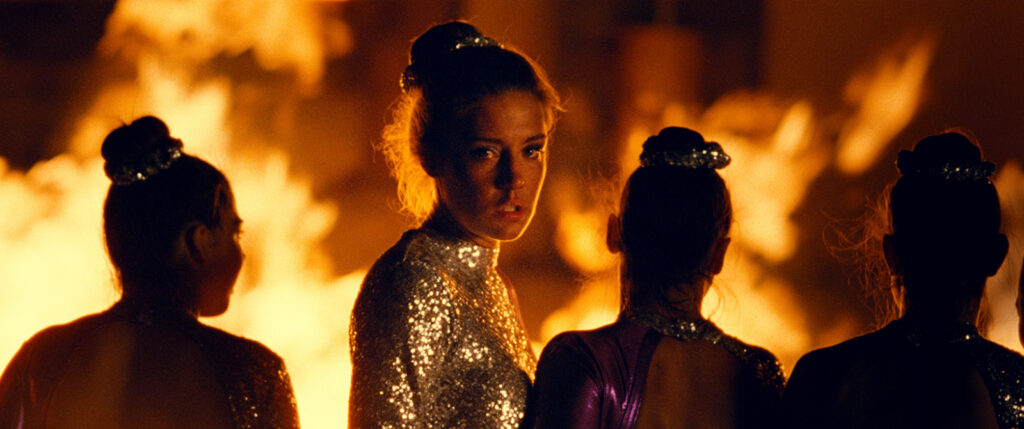Now showing: Queer witchy thriller, The Five Devils
Acclaimed breakout filmmaker Léa Mysius (screenwriter for Claire Denis) tells us about her latest work, The Five Devils, a witchy and wildly imaginative fable out of family secrets and queer romance.
Vicky, a strange and solitary little girl, has a magical gift: she can reproduce any scent she likes, and collects them in a series of carefully labeled jars. She has secretly captured the scent of Joanne, her mother for whom she nurtures a wild, excessive love. When her father’s sister Julia bursts into their life, Vicky reproduces her smell and is transported into dark and archaic memories which lead her to uncover the secrets of her village, her family and her own existence.
Directed by Léa Mysius and written by Léa Mysius, Paul Guilhaume The Five Devils stars Adèle Exarchopoulos (Blue Is the Warmest Color), Sally Dramé, Swala Emati, Moustapha Mbengue, and Daphné Patakia.
The film has been hailed as “a queer, witchy thriller” (Deadline); Exarchopoulos is “at her best here, playing a force of nature.” (The Playlist).
Interview with Léa Mysius
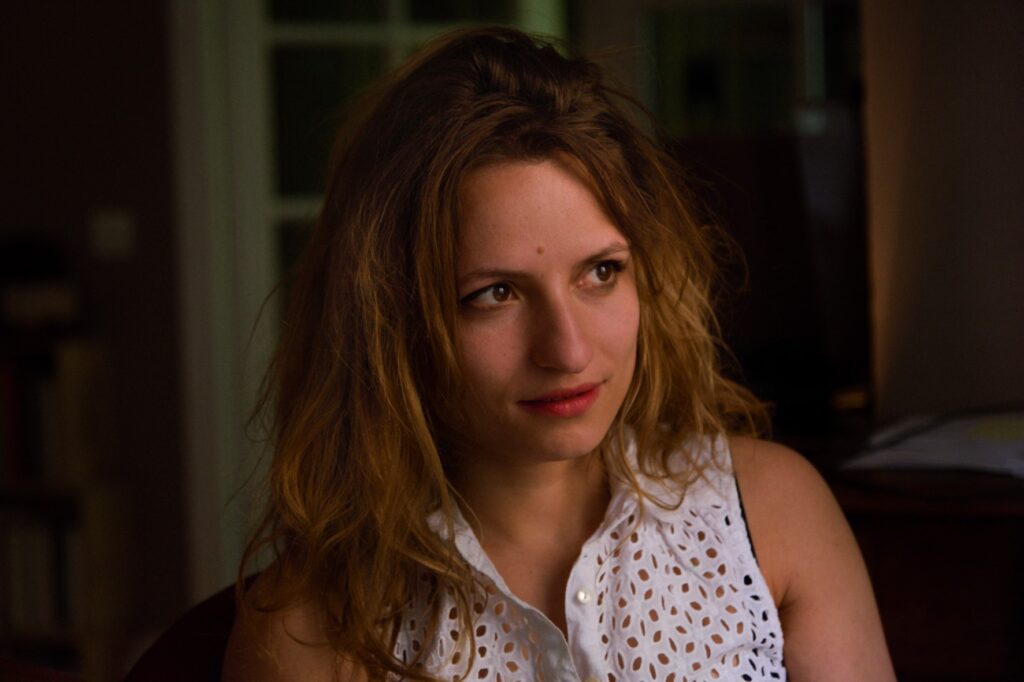
How was The Five Devils born?
Léa Mysius: From the desire to bring these characters to life. The script was built like a mosaic around the idea of a little girl obsessed with smells. It comes from a very personal interest in the subject. Since I was very young, I have been training myself to smell, to recognize aromas and reproduce them, ranging from vile potions concocted in my early childhood to, much later, proper training to try and understand perfume extraction and composition. But this wasn’t about a desire to enter the world of perfumery; I immediately looked for something more primitive, more purely sensory with no relation to the industry.
The scenes were first imagined, in no particular order, starting from the characters of the Soler family — more particularly Joanne (Adèle Exarchopoulos) and Vicky (Sally Dramé) – then, little by little, the story was organized around a few foundational scenes. While writing I read a lot of American writers, like Jim Harrisson, James Baldwin, Jonathan Franzen and Maya Angelou, and I think the inspiration came from there, even if I always tried to anchor the film in France and not attach social and political issues from another continent. What remained of it was the desire to mythologize places and characters as Jim Harrison did in ‘Dalva’ or Philip Roth in ‘American Pastoral’. Following this desire, I set the story in a village at the foot of the Alps, in a grandiose landscape with a mixed-race family and a mythical character: Joanne, a former Miss Rhônes-Alps turned swimming instructor, whose daughter, Vicky, will discover the hidden past.
I liked the idea that the story was seen by this strange and solitary little girl, who has a funny and slightly disturbing look. One of my big references while writing was The Tin Drum by Volker Schlöndorff, a film that haunts me. One reader of the screenplay described The Five Devils as an intimate saga. I quite like that.
The little girl, Vicky, does indeed have a powerful sense of smell, which takes us into a fantastic dimension. Did you want to make a genre film anchored in the reality of the French countryside?
Léa Mysius: When I started, I didn’t think I was going to make a genre film, but I quickly switched to
the fantastical. This shift had already started in Ava. I love constructing another reality, from a desire to re-enchant the world, to propose a new belief system. During the writing, Vicky’s obsession turned into a magical power with the idea that this little girl is physically transported into her parents’ memories. At first it came from the simple relationship between smells and memories – Proust’s madeleine, if you like. There are other films that feature characters transported back into their own memories, Wild Strawberries by Bergman, for example. But here what touches on the fantastical is that Vicky is drawn into memories that are not hers. These visions come from a source of inspiration that was originally rather psychoanalytic. Pascal Quignard in his book ‘The Sexual Night’ talks about the relationship between children and their origin and it goes back to the question that Vicky asks her mother: “Did you love me before I existed?” Every human being dreams of this primal scene that they’ll never be able to see, the one where they were conceived by their parents. In Quignard’s book, there is the idea that the child dreams of flames, a massacre, screams, preceding their conception. This refers to the first scene of the film.
The Five Devils works around these existential questions: how did I come into the world and why did I come into the world as me? Here, we understand that Vicky is the fruit of the love between two women, Joanne and Julia, who couldn’t biologically conceive together, so the brother of one of them came into play…I didn’t want the film to be too cerebral. Choosing the fantasy genre allows me to talk about the meanders of human obsessions in a playful, spectacular and chilling way. This is how references such as Twin Peaks by Lynch, The Shining by Kubrick or Get Out and Us by Jordan Peel are laid over the literary and psychoanalytic references. The film is situated at the crossroads of all these thoughts and desires that I made my own, which gives it a rather hybrid form. I wanted to anchor the narrative in the mountains of a small French village. I like to film France as you don’t often see it in films, and to talk about a French family today in a French village today with problems that are ours. I wanted this film to make us reflect on our society, our life choices, our disillusionments, our obsessions. The fantastical is only a means and not an end.
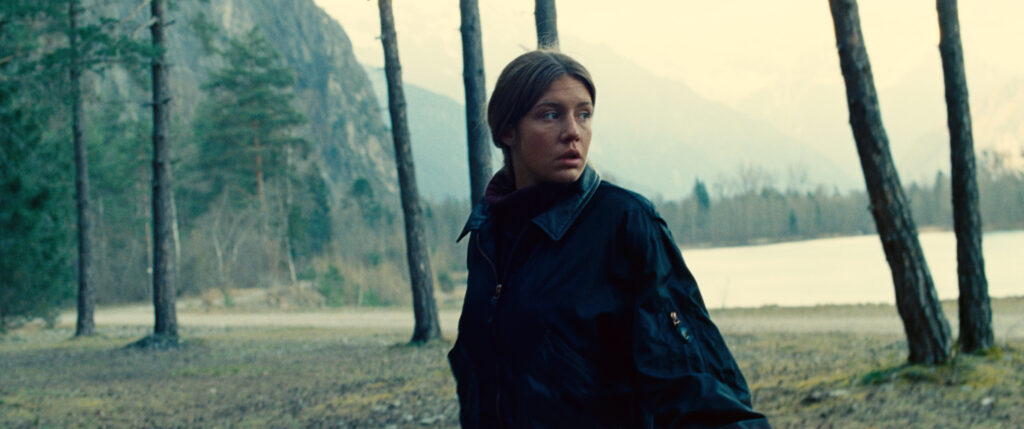
Adèle Exarchopoulos is remarkable, in an unusual maternal role. Did you have her in mind when you were writing?
Léa Mysius: No, at the beginning, it was still very abstract. When we thought of Adèle, who is exactly the opposite of the character, that was interesting. At the beginning of the story Joanne is a cold person, dead inside, really the opposite of Adèle, and it’s only as the film unfolds that the wall Joanne built to protect herself starts to crack, that her vitality appears. Adèle had to control her face, her gestures, to express nothing, until she exploded in the second part. But when it’s all interior, you can tell she’s boiling inside, because it’s Adèle, she oozes vitality, even if it’s contained. She’s unbelievable. On set, she kept on making incredibly accurate suggestions. She did a lot of preparation to have the sporty physique she has in the film. She also had to be able to play two ages, 17 and 27, and two states: that of the present where she is well- behaved and subdued, in opposition to that of the past where she’s incandescent and full of dreams. Adèle has the beauty of a “Miss” and at the same time a roughness, lots of nuances, an iconic side, but also unaffected, which makes us immediately in empathy with her… we recognize ourselves in her. She’s an amazing talent; I was really blown away by her.
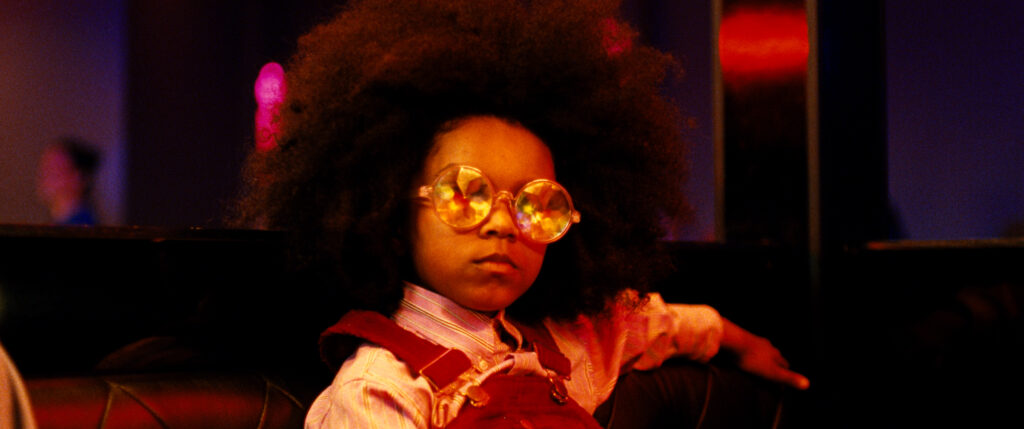
The young Sally Dramé is excellent. Did it take you long to find her?
Léa Mysius: Surprisingly, no. She was among the first candidates, and I immediately noticed her. Casting for me always works like love at first sight. As if I recognized my character in someone and there was Sally, it was obvious. Surely because she has something of Oskar in The Tin Drum… Sally projects a maturity beyond her age. I also like her comic physicality, with her hair standing up and her huge eyes. She’s a real character. She had to be cheerful while possessing depth and a disquieting strangeness. Sally has a face that could be that of an adult, with something that seems to come from the depths of age. Like a wise old woman. At first, she didn’t really know how to act, so she recited her text. But she worked hard, like a child who listens, serious, focused, intelligent and patient. She really came into her own on set, she understood how to nourish her character from the inside, and you can say she became a real professional actress. Towards the end of the shoot, I was directing her like Adèle, it was incredible.
Would you say that this film is also, in its own way, implicitly political?
Léa Mysius: Yes. When I make a film, I’m always torn between proposing new systems of representation and showing reality as it is. I wanted the main characters to be female and mixed-race. It was very important for me to show diversity in the depths of a mountain village. Especially nowadays when the National Rally (formerly National Front) is the second party in France. This is why the film is political, in showing female characters and/or characters of immigrant origin acting, in control of their destiny and carriers of a desire for emancipation in the face of the injunctions of society embodied by the village and its inhabitants. It’s also political in showing the latent racism or homophobia that these same people must endure.
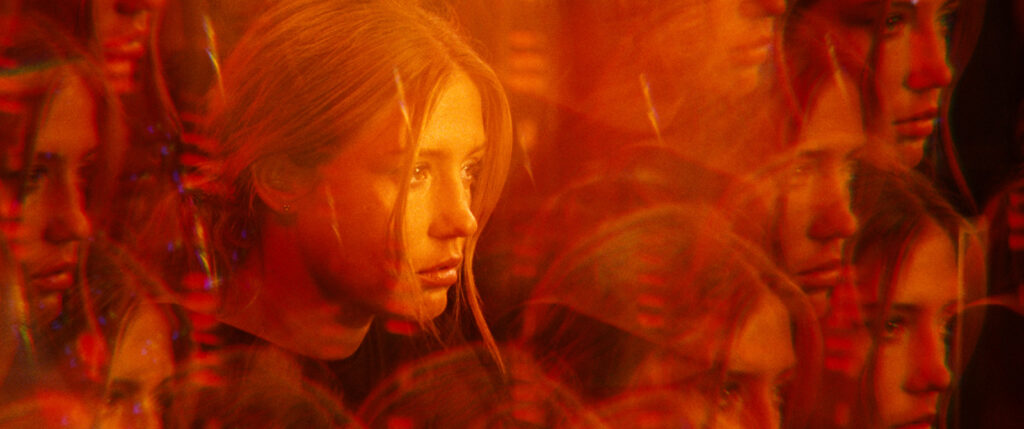
I never wanted it to be too head-on, precisely to show how insidious this evil can be. If the inhabitants of the town reject Julia it’s because she has committed a crime, not because she is Black or gay, but we can feel that in their eyes that this aggravates the situation. I wanted all these unsaid things to inhabit the film to the point of suffocation. They are embodied by these huge mountains surrounding the village which give it a very particular atmosphere. The children who harass Vicky call her “Bog brush” because of her afro-styled hair. Joanne’s father (Patrick Bouchitey), even if he is at first shown as a fun grandpa and loving dad, is in fact homophobic and racist. I didn’t want this to be too pronounced but rather that it’d spread like poison. What I would like to expose through nuance and by blurring direct representation is that racism, homophobia and hatred of difference are still very present, even if they’re not upfront. And that it’s this base, these foundations of hatred, rooted in irrational, “skillfully” maintained, fears which are terrifying and against which we must fight. Don’t let yourself be charmed by so-called calm speeches or “jokes” that sugarcoat the pill. I would like this gallery of characters that we discover one by one in various aspects to push us to open our senses and capacity for judgement, to accept certain things and reject others. Nothing is ever all black or all white. I hope The Five Devils will encourage the viewer to remain always active, always alert. Because that’s what seems dangerous to me in view of the rise of the far right and the discourse of stigmatization and hate: passivity.
Men are on the margin of this story, it’s the women who act, set off fantasies, trigger events. In this regard, is The Five Devils a film about the power of women, whether positive or malign?
Léa Mysius: I didn’t formulate it to myself like that. In this story, the power is held by women, they are indeed powerful, they act, unlike the men. Jimmy (Moustapha Mbengue) is insubstantial but reveals himself at the end. He steps aside for the happiness of the woman he loves; I think that’s beautiful and makes him powerful in another way. The Five Devils talks about transmission, and it’s true that Julia’s and Vicky’s magic power is passed on from woman to woman as shown in the final image.
It’s probably because, like many feminists today, I am haunted by the figure of the witch and the undefeated power of women. Without desiring to exclude men: even if they are in the background, I try to propose an alternative to the traditional male role.
In the end, it is little Vicky who is the most powerful, because it’s thanks to her magical powers and her intervention in the past that Joanne and Julia have been separated by the fire. As a consequence, Joanne will choose Jimmy and thus Vicky can be born. It is a power but also an enormous burden: having to fight to exist. And it’s even more challenging when you’re a woman — a little mixed- race girl, in this case.
The events of the film happen because women want to recapture the love and desire that has escaped them. Their sexuality is the driving force behind the story. Is it more precisely a film about the power of female sexual desire?
Léa Mysius: I haven’t theorized it like that but maybe it is. Desire is at the heart of my work and obsessions. But I don’t think sexuality is the driving force of the story, desire is not only sexual. The driving force here is Vicky’s quest to find out where she comes from. At first, she sees Julia as a rival to eliminate because it seems that she is stealing her mother’s love, she’s an obstacle in her way. Her journey will lead her to realize that love isn’t subtracted when it is shared, on the contrary, it increases. This story will make her grow and thus better manage her immature desire to fully possess her mother. She will also find emotional independence and turn to her father who she has totally excluded until then. It’s a film about reconciliation. The chaos provoked by Julia’s arrival starts getting organized, lives are recast, and a new balance is found, more peaceful, stronger, happier.
About the filmmaker
French writer/director Léa Mysius was born in 1989. After a number of short films which were widely noticed at festivals, her feature film debut, Ava, premiered at Critics’ Week in Cannes in 2017, where it was awarded the prix SACD. She has written with fellow directors, notably Claire Denis, Jacques Audiard and Arnaud Desplechin. 2022 sees her return behind the camera with The Five Devils which premiered at Director’s Fortnight.
FILMOGRAPHY
2022 THE FIVE DEVILS | Writer/Director
2022 STARS AT NOON by Claire Denis | Writer
2021 PARIS, 13TH DISTRICT by Jacques Audiard | Writer 2019 FAREWELLTOTHENIGHTbyAndréTéchiné|Writer 2019 SAMOUNI ROAD by Stefano Savona | Writer
2017 AVA | Writer/ Director
2017 ISMAEL’S GHOSTS by Arnaud Desplechin | Writer

